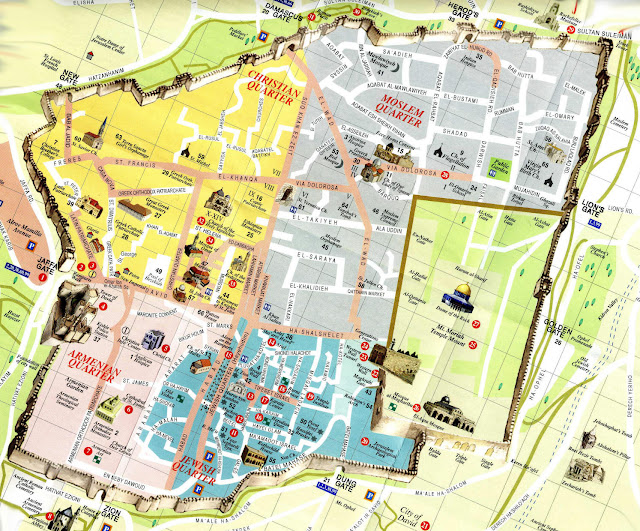While crossing via
King Hussein Border into Israel, we make 2 pit stops - one in Jordan and one in
Israel itself.
Jordan King Hussein
Border crossing offices are located in Jordan valley just over 46 kms west of
Amman. Allenby Bridge is further 5kms,
where Israeli border offices are located.
Jordan Stop:
All 3 buses stopped
- and our passports were collected. Our local guides from took all passports on our behalf to offices
nearby. Scene was a bit chaotic, I saw many buses tugging away luggage trolleys
- am not sure which direction they were moving. It took us good 2 hrs before
our passports were returned and we were allowed to leave. Cafeteria was basic
and amenities were poor. It seems delay was due to Jordanian border officers
taking longer than usual tea / smoking break.
Allenby Bridge - Israeli
Border:
After a short drive
, we crossed unimpressive Allenby bridge overr dried up Jordan river, to enter
enclosure of Israel border crossing. It is protected by security cameras and
electric barbed wires. Buses had to stop at various swing gates before we could
disembark.
 |
| My recollection of Israel Crossing at Allenby bridge |
- Step1 - Luggage Check in: Take your luggage and go to first counters to get security tags (ditto to airport check in tags), take one for each bag to check in. You need to show your passport, and they put a white sticker at back cover of the passport with a bar code and mention of number of bags. It's a bit chaotic and there is no lane discipline, space is cramped because other queues occupy most of check in area. Put tags on luggage and drop it on belt. Carry your light luggage and join a nearby queue for next check. Buses from Jordan will now return - so ensure you leave nothing back in the buses. All transport after successful crossing is Israeli.
- Step2 - Passport Check: There are 3 windows, and all they do here is to check your passport and put a small blue sticker with some numbers below the white check-in sticker at back of passport. No courtesy is shown by staff and at times people may be made to go to back of the queue if they try to hurry or touch swing gate barrier. A man in front of me what sent back as he tried to push open the barrier. I saw an old lady crying, shouting and pleading to security guys near the counter - I could not understand what was the matter as it was in Arabic.
- Step3 - Security check: Typical airport security, but no restriction to put liquids in clear bag. Keep your passport with you and put all belongings on trays for scanning. I walked too fast through security gate, so was made to walk 2-3 times - very slowly. Passport is checked again to match your photo and you can collect your belongings once on the other side. I saw a few ladies being taken for additional security check behind the curtains- there was female security staff.
- Step4 - Visa on Arrival : After you leave security area, you come to a small space where toilets are located. They looked cleaner compared to those in Jordan. Adjacent to toilet is a small shop selling refreshments. They accept all sort of currencies, guy who worked there was friendly. Then you enter a large hall on your right where you join one of the queues. Staff at the counters looked tired and frustrated - a lady officer was upset because people were double queueing. You go and show your passport, if you are lucky - a few questions and you will get the visa and leave, but if you are lucky enough to be young (18-45 yrs) or unlucky old , your passport will be taken and you will be handed over a form (which is a poor photocopy) to fill and go to waiting area. You fill the form and this is where the wait starts. WiFi is free - but I chose not to connect. Air conditioning ducts looked improvised, and were of cloth tubing with holes. Every now and then a blast of air inflated them drawing attention of people arriving. There are a few outcomes possible from here,
- Outcome 1: No further questioning, and your passport along with visa will be returned by officer calling your name. In our case, our group leader was around so he was making sure all names are called out from our group who were waiting there.
- Outcome 2: You will be called for further questioning into a separate area, which can be typical grilling at any country who wants to ensure travellers are no threat to their security. Then you will be given visa and let go. Waiting can be hours in some cases. In both cases above, a visa card is issued which is typically valid for 3 months from date of entry. You don't need to ask officers not to stamp your passport, they already know it - and may even get irritated if you remind them.
- Outcome3: Worst case, you may be sent back for any reason deemed appropriate by immigration / security staff.
- Step5 - Luggage collection: Luggage will be put in neat lines , you can leave once you collect yours - you may be asked to show passport/ visa on the way to exit. I wasn't asked any question myself though.
- Step6 - Exit: load your luggage on the bus waiting in parking, and you can leave when bus is ready.
Worth noting that there is no visa fee to enter Israel - however there is a departure tax, which I will talk about in a later post under 'Crossing from Israel into Jordan'











